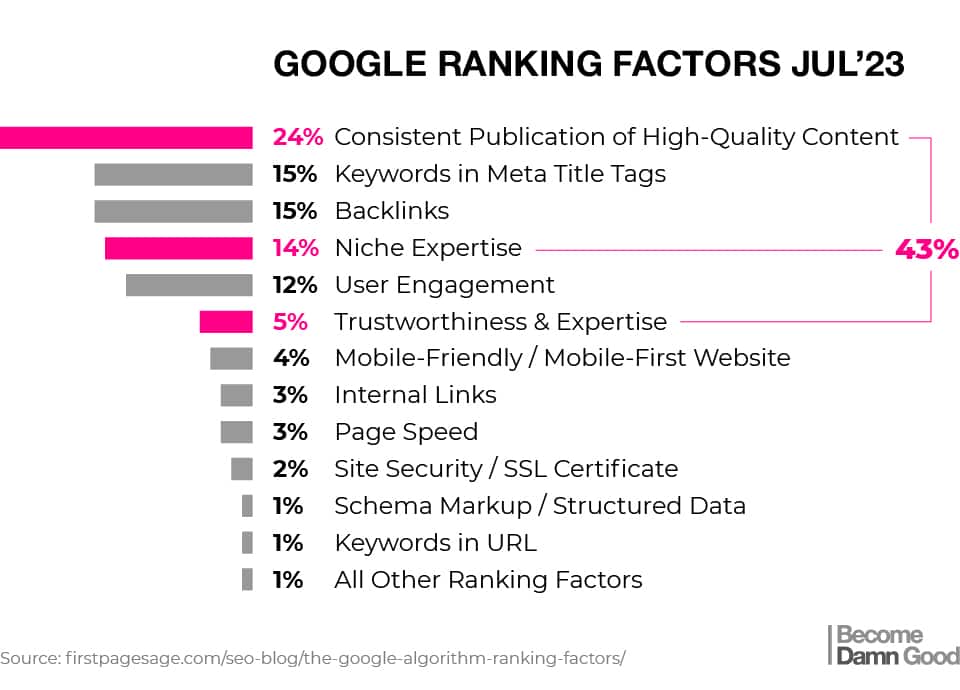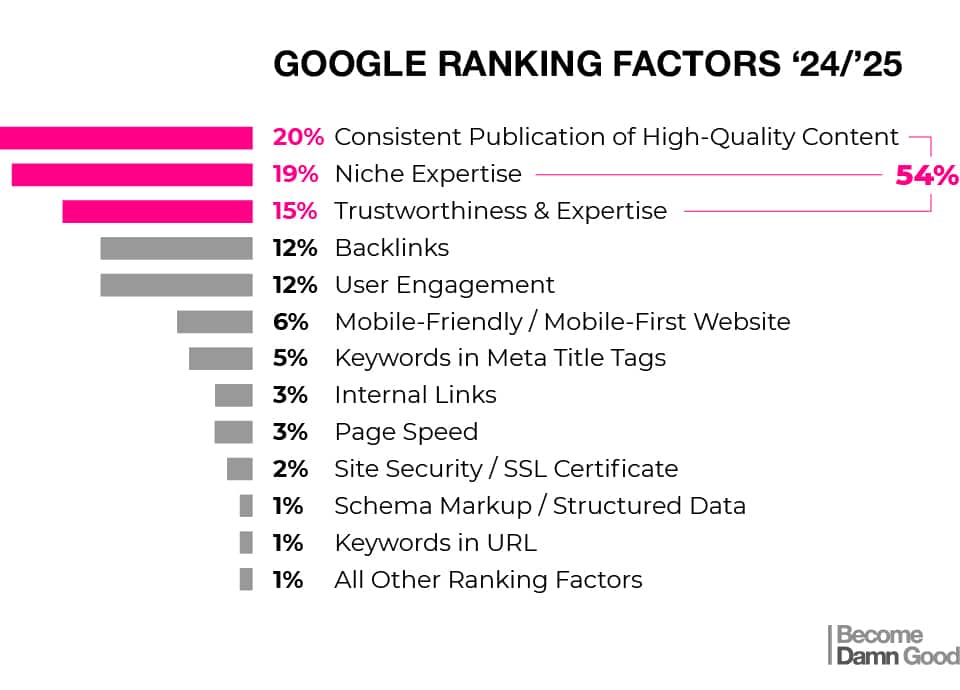From SEO Tricks to Kick-ass Content: The Role of AI in Future Rankings
Have you ever tried to find something online only to find that the first four or five links you clicked on don’t provide what you’re looking for? Instead of being informative, they seem more like sales pitches.
No one has a working crystal ball, so predicting the future always remains challenging. However, we can look at the recent developments in the integration of AI within search engines. We can also observe how Google has adjusted its algorithm accordingly. With this information, we can make cautious assumptions about how to rank in 2024 and 2025 with content published today. I expect these developments to be positive.
I believe that these new developments will encourage companies in a positive way to publish better, more honest, authentic, and informative content.
The so-called SEO tricks that lure you to a site, only to burden you with sales articles mixed with some nonsense information, will hopefully be a thing of the past. Soon, it will all be about content and what you genuinely have to offer as a business. You can’t avoid it.
Table of Contents
Google’s Current Ranking Factors in 2023
In recent years, the importance of having many good backlinks has greatly decreased. In the past, with enough money to buy backlinks and place many low-content articles, you could quickly achieve a high ranking.

However, what has increased in importance as a ranking factor is consistently publishing engaging content, showcasing niche expertise, and being recognized as a trustworthy author with expertise. Together, these factors account for about 43% of Google’s ranking factors. I will delve into this in this article.
Interestingly, user engagement is now less important than niche expertise. Factors like a mobile-first website, internal links, and site speed also seem less relevant anymore. The reason for this is the evolution of artificial intelligence. With so much content available on the internet, AI can present this information more efficiently and effectively than any human ever could.
Put differently: AI analyses and presentations could potentially replace up to 90% of the current internet content. Why would Google direct you to a webpage when their own AI, like ‘Bard’, can present the information much more effectively?
In this context, the importance of backlinks and internal links diminishes. This is because ‘Bard’ can more precisely identify which content is genuinely informative and how it relates to other content.
Predicting Google’s Ranking Factors in 2024/2025

I am becoming increasingly convinced that soon it will be almost impossible to rank high in Google with a simple low-content article. I estimate that up to 90% of short articles on general topics like flowers, plants, Christmas trees, car purchases, and even SEO advice – produced by the many emerging SEO agencies – will lose their ranking potential.
The reason for this is that they are simply no longer relevant. Google is looking for current and in-depth knowledge from real experts within a specific niche. That’s the kind of information AI simply can’t provide. If this assumption is correct, factors such as consistent publication of engaging content, niche expertise, and proven reliability and expertise could account for as much as 54% of ranking factors. That’s a significant finding!
This potential change in Google’s algorithm means that companies will have to think more carefully about how and with what kind of content they want to present themselves online. ‘Honest’ companies with an authentic and informative story will win against quick, superficial sales pitches. I consider this to be a meaningful development.
How to Anticipate the Future of SEO?
Of course, backlinks and other ranking factors will remain relevant for a while in terms of SEO and ranking. I suspect these will remain basic factors. However, it’s clear that low-quality content will soon be a thing of the past.
I’ve been saying it for years: when you write something, make sure it’s genuinely informative to the best of your knowledge and ability. Don’t just publish to have content on your site. Make sure you genuinely add value for the reader, and that goes beyond a great product, specifications, a good price, and a short article.
The only option seems to be to review all low-quality content and give it a substantial update. Because soon it will be about what you genuinely have to say, not about the number of pages you’ve filled with unnecessary content.
Doing nothing is, of course, a choice, but you risk losing a large part – or perhaps all of your – organic search traffic.
Who Will Benefit from AI Integration in Search Algorithms?
The recent developments mean that many ‘big’ companies, as well as companies that have heavily invested in SEO in recent years, are facing significant challenges. However, for smaller businesses that did not have the financial firepower but do provide valuable information, there are now huge opportunities. They will finally get the recognition they deserve.
Individuals and smaller brands often have unique and valuable contributions that can be of great significance to users. Where they were previously often overshadowed, they will soon be able to come to the fore thanks to AI.